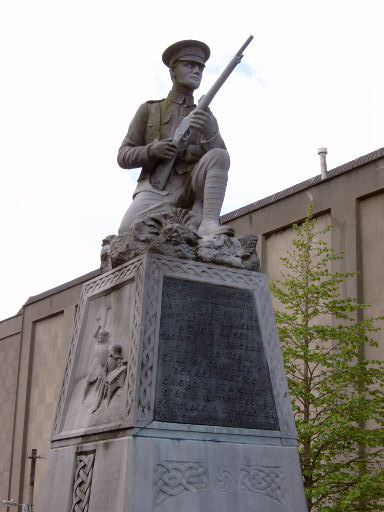“The Foggy Dew” is a classic Irish ballad that made its first appearance in music books during the 1800’s. However, “The Foggy Dew” was popularized during the Easter Rising of 1916. With its inspirational lyrics, the song became inextricably tied to the sentiments of the Rising. The song was also popularized by The Chieftains. In recent years, the song has been popular as an anthem for athletic events. Notably, the song was used by Conor McGregor, for his intro to UFC 189. The lyrics are as follows:
The Foggy Dew
“As down the glen one Easter morn to a city fair rode I
There Armed lines of marching men in squadrons passed me by
No fife did hum nor battle drum did sound it’s dread tatoo
But the Angelus bell o’er the Liffey swell rang out through the foggy dew
Right proudly high over Dublin Town they hung out the flag of war
‘Twas better to die ‘neath an Irish sky than at Suvla or Sedd el Bahr
And from the plains of Royal Meath strong men came hurrying through
While Britannia’s Huns, with their long range guns sailed in through the foggy dew
‘Twas Britannia bade our Wild Geese go that small nations might be free
But their lonely graves are by Suvla’s waves or the shore of the Great North Sea
Oh, had they died by Pearse‘s side or fought with Cathal Brugha
Their names we will keep where the fenians sleep ‘neath the shroud of the foggy dew
But the bravest fell, and the requiem bell rang mournfully and clear
For those who died that Eastertide in the springing of the year
And the world did gaze, in deep amaze, at those fearless men, but few
Who bore the fight that freedom’s light might shine through the foggy dew
Ah, back through the glen I rode again and my heart with grief was sore
For I parted then with valiant men whom I never shall see more
But to and fro in my dreams I go and I’d kneel and pray for you,
For slavery fled, O glorious dead, When you fell in the foggy dew.”
It should be note that the song has gone through many iterations, with the most popular version being published during Easter Rising of 1916. There are multiple references throughout the song to both the Rising, and to the city of Dublin. With references to Pearse and Cathal Brugha, it becomes clear that the song was edited to specifically highlight the heroes of the Rising.

Its interesting to note how a song, which had been regarded as a classic, was revitalized and politicized for modern usage.
Similar to “The Fields of Athenry,” this song contains references the the heroism of the dead Irishmen and Irishwomen who gave their lives for freedom.
The song highlights the injustices committed by the British against the Irish people. The British had massive amountsof control over almost every aspect of Irish life. It was common for the British to restrict the trade of the Irish. British authorities were in control of the main ports in Ireland (Belfast and Dublin) and economic officials tended to favor their fellow Englishmen in their businesses. Businesses like Guinness were highly favored by the British due to their directors showing support for British rule. A combination of economic and personal oppression inspired the rebellion in 1916.
One of the most important aspects of this song is its final verse. Much of Ireland’s history revolves around grief from past injustices, and this emotion appeals deeply to Irish consciousness. This grief is inextricably linked to the Irish fight for freedom.
 The final line praises the “glorious dead” who have finally escaped the chains of the British. For the Irish, death often seemed the only escape from British rule. As a result, death in the service of Ireland was seen as a privilege. However, it remains that the Irish must avenge thei fallen brothers and sisters.
The final line praises the “glorious dead” who have finally escaped the chains of the British. For the Irish, death often seemed the only escape from British rule. As a result, death in the service of Ireland was seen as a privilege. However, it remains that the Irish must avenge thei fallen brothers and sisters.
The song directs the grief of the Irish people into violent retribution. It seems likely that this was intentionally used by supporters of the Rising to encourage people to realize that freedom from British oppression was at hand, and that with their sacrifice, they both freed themselves, and avenged the fallen.
With this song , it is important to highlight the performative differences of the Dropkick Murphys, the Wolfe Tones, and the Dubliners. In stark contrast to the other groups, the Dubliners chose to record this song without the final verse. Their true intent in doing so is unknown,but it can be assumed that they left it out to avoid showing support for the inflammatory rhetoric it encouraged. This choice has been heavily speculated on, and it is likely that it was made with considerations to the Dubliners commercial interests.
Similar to “The Fields of Athenry,” it is likely that these three groups chose to record this song for its commemorative nature. The song shows reverence for soldier and civilian alike who died in service of Ireland. However, the political nature of this song cannot be forgotten, and its appeal to the culture of Irish suffering serves to make the song popular amongst Irish listeners to this day.
